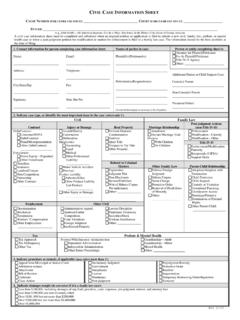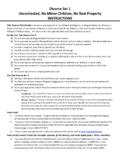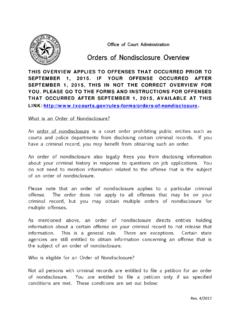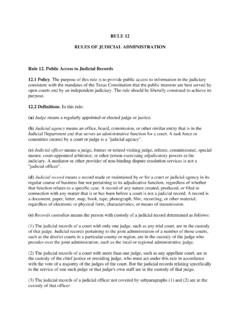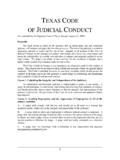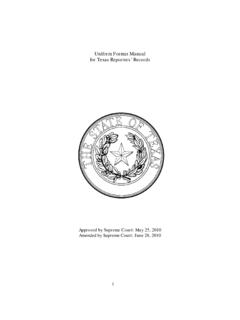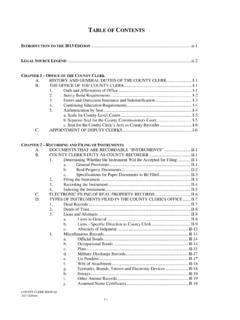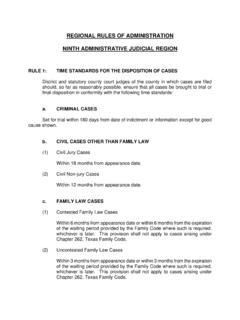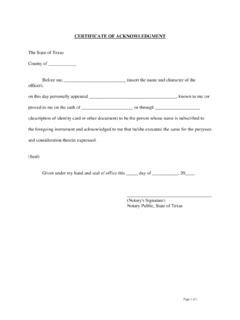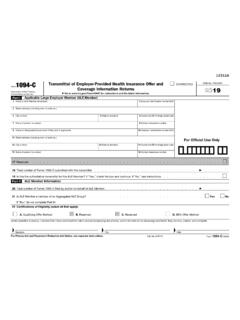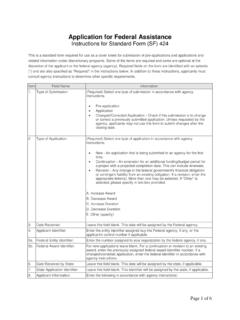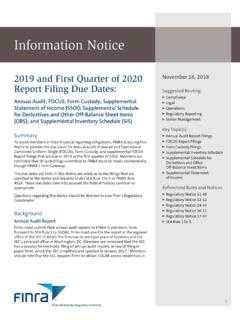Transcription of Legal Information vs - txcourts.gov
1 Legal Information vs. Legal Advice Guidelines and Instructions for Clerks and Court Personnel Who Work with Self-Represented Litigants in Texas State Courts Edited for use in Texas by: Texas Office of Court Administration Texas Access to Justice Commission Texas Access to Justice Foundation Texas Legal Services Center September 2015 Page | 1 Table of Contents Introduction .. 2 Roles and Responsibilities of Clerks and Court Personnel .. 3 Why Clerks and Court Personnel Must Not Give Legal Advice, But Should Provide Legal Information .. 4 What is Legal Advice? .. 5 What is Legal Information ? .. 5 What is Ex Parte Communication? .. 6 Quality Service: Strategies for Answering Difficult Questions .. 7 Procedural Explanations vs. Procedural Recommendations .. 8 General Information about Court Operations vs. Confidential or Restricted Information about Court Operations.
2 9 Explaining Legal Terms vs. Providing Legal Interpretations .. 9 Providing Forms and Approved Instructions vs. Filling Out Forms .. 10 Public Case Information vs. Confidential Case Information .. 11 Options vs. Opinions .. 13 Citing Statutes, Court Rules and Ordinances vs. Researching Statutes, Court Rules and Ordinances .. 14 General Referrals vs. Subjective or Biased Referrals .. 14 Permissible vs. Impermissible Forms of Ex Parte Communication .. 15 Appendices Handout/Sign: What Clerks and Court Personnel Can and Cannot Do.. 17 Resources and Referral Information .. 18 Page | 2 Introduction Each year thousands of people represent themselves in Texas courts. It is crucial that clerks and court personnel understand how to help the self-represented without giving Legal advice. This manual will help explain the difference between Legal Information and Legal advice. You are the face and voice of justice in Texas. How you respond to questions about the court system affects how people feel about justice, as well as their access to justice.
3 If someone does not understand how to use the court system, and you do not provide available and needed Information , that person may be denied access to the courts and to justice. This manual is specifically intended for the use of clerks and court personnel who provide telephone and counter assistance. It is recommended that you keep the manual in a place where it is easily accessible. Of course, it cannot anticipate all the possible questions that self- represented parties might ask. If you are unsure if your response to a question would constitute giving Legal advice, refer to this manual. You can also check with your supervisor. The manual also contains a one-page list of some things clerks and court personnel can and cannot do (see page 17). This list is designed to be used as a handout or a sign posted at the clerk s counter or public window so that people can read and understand the guidelines that you are required to follow.
4 The law is complicated and confusing. Encourage people to talk to a lawyer about their situation. The Resources and Referral Information section of this manual describes a variety of ways people can get help. Page | 3 Roles and Responsibilities of Clerks and Court Personnel PROVIDE ACCESS TO THE COURTS One of the basic principles of the American justice system is that the doors of our courthouses are open to everyone. Most members of the public, however, are not familiar with courts or court procedures and require some level of assistance. Access to justice is, in effect, denied if members of the public do not know how to use the court system, and the courts do not assist them in some meaningful way. The court is obligated to explain court processes and procedures, to provide quality service, and to provide accurate Information to all members of the public. An understanding of what Information can be provided to the public will significantly affect access to the courts and the administration of justice.
5 PROVIDE SERVICE WITH ACCURATE Information Accessibility to the judicial system is affected by the accuracy of Information provided by the court to members of the public, along with the manner in which it is presented. Clerks and court personnel are responsible for giving court users the service they need and deserve by providing accurate Information in a competent, cooperative, and timely manner. The public s first and only contact with the judicial system may be with clerks and court personnel, whose responses have an impact on how people view their court experience. The court should treat all court users fairly and equally: attorneys, defendants, self- represented litigants, and others. In other words, clerks and court personnel should feel comfortable providing the same Information to self-represented litigants that they provide on a routine basis to attorneys. All members of the public are entitled to the same Information .
6 Providing Information to a lawyer that would not be provided to a self-represented litigant is not equal. Similarly, providing Information to a self-represented litigant that would not be provided to a lawyer is not equal. Clerks and court staff should learn the rules about ex parte (one-sided) communication with the judge, and should not let members of the public use them to circumvent that principle. Effective service may reduce the number of times court users must come to the courthouse, and thus reduce stress on the court system. Provide accurate Information because even seemingly small mistakes can affect people s lives or the outcome of court cases. It is better to be honest and say I don t know than to give incorrect Information . Page | 4 Why Clerks and Court Personnel Must Not Give Legal Advice, But Should Provide Legal Information CLERKS AND COURT PERSONNEL MUST REMAIN NEUTRAL Remain neutral and do not promote or recommend a particular course of action to court users.
7 Although you may have processed many similar types of cases, you do not know what is in a court user s best interest. Only they or their attorneys can make that determination. CLERKS AND COURT PERSONNEL MUST REMAIN IMPARTIAL Impartiality is similar to neutrality, but focuses on equal treatment of court users. Court knowledge must be shared fairly and equally. Never give advice or Information that favors one side or the other. Do not disclose confidential Information or become involved in or facilitate an ex parte communication. CLERKS AND COURT PERSONNEL MUST NOT ENGAGE IN THE UNAUTHORIZED PRACTICE OF LAW Only attorneys licensed to practice by the Supreme Court may give Legal advice. Do not engage in the unauthorized practice of law by providing Legal advice. Even court personnel who themselves are licensed attorneys may not give Legal advice to court users because doing so would violate the principles of neutrality and impartiality.
8 The unauthorized practice of law statute, Section of the Texas Government Code, states: (a) In this chapter the practice of law means the preparation of a pleading or other document incident to an action or special proceeding or the management of the action or proceeding on behalf of a client before a judge in court as well as a service rendered out of court, including the giving of advice or the rendering of any service requiring the use of Legal skill or knowledge, such as preparing a will, contract, or other instrument, the Legal effect of which under the facts and conclusions involved must be carefully determined. (b) The definition in this section is not exclusive and does not deprive the judicial branch of the power and authority under both this chapter and the adjudicated cases to determine whether other services and acts not enumerated may constitute the practice of law. (c) In this chapter, the practice of law does not include the design, creation, publication, distribution, display, or sale by means of an Internet web site, of written materials, Page | 5 books, forms, computer software, or similar products if the products clearly and conspicuously state that the products are not a substitute for the advice of an attorney.
9 This subsection does not authorize the use of the products or similar media in violation of Chapter 83 and does not affect the applicability or enforceability of that chapter. The above statute does not provide an exhaustive list of what constitutes the practice of law. The Supreme Court of Texas has held that the courts ultimately decide what is and is not the practice of law. What is Legal Advice? Court users are asking for Legal advice when they ask whether or not they should proceed in a certain fashion. Telling a member of the public what to do rather than how to do it may be giving Legal advice. Legal advice is a written or oral statement that: Interprets some aspect of the law, court rules, or court procedures; Recommends a specific course of conduct a person should take in an actual or potential Legal proceeding; or Applies the law to the individual person s specific factual circumstances. What is Legal Information ?
10 Clerks and court personnel may: Provide public Information contained in dockets, calendars, case files, indexes, and other reports. Recite common, routinely-employed court rules, court procedures, administrative practices, and local rules, and explain generally how the court and judges function. Refer self-represented litigants to a law library or the court s website for statutes, court rules, or forms. Explain the meaning of terms and documents used in the court process. Answer questions concerning deadlines or due dates (without calculating due dates). Identify and refer self-represented litigants to court forms. Page | 6 Clerks and court personnel may NOT: Recommend whether to file a certain pleading. Recommend wording or content for a pleading. Recommend specific people against whom to file pleadings. Recommend specific claims or arguments to assert at trial. Recommend what type of damages to seek or from whom to seek them.
